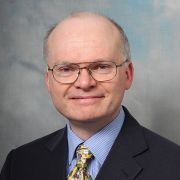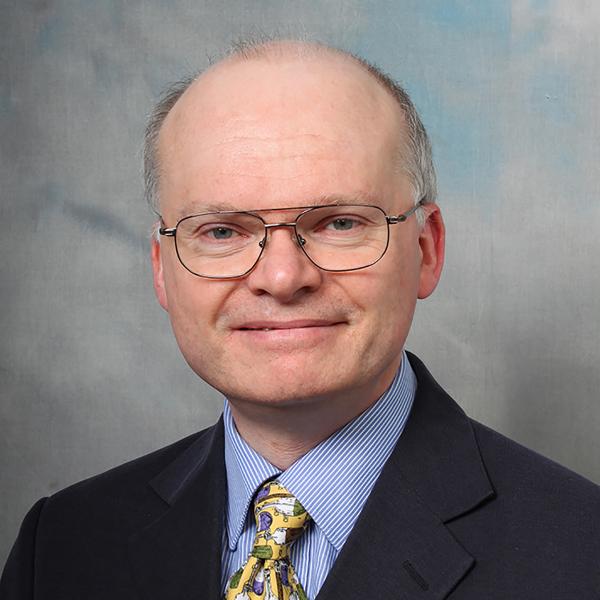Emeritus Professor Richard F.W. Jackson
School of Mathematical and Physical Sciences
Emeritus Professor of Synthetic Organic Chemistry


+44 114 222 9464
Full contact details
School of Mathematical and Physical Sciences
Dainton Building
13 Brook Hill
Sheffield
S3 7HF
- Profile
-
Prof. Jackson obtained his BA in Chemistry from the University of Cambridge in 1981. After his PhD (Cambridge 1984) he became a Postdoctoral Research Fellow at the ETH in Zürich, Switzerland. In 1985 he was appointed to a lectureship at the University of Newcastle, where he was promoted to Reader in 1994 and to Professor in Synthetic Organic Chemistry in 1996.
In 2001 he was appointed to a Chair in Synthesis at the University of Sheffield. He served as Head of the Department of Chemistry from 2003-2007, returning to this role for a further term between 2011-2014.
- Research interests
-
I carried out research for my PhD under the supervision of the late Professor Ralph Raphael. I developed a new route to dihydrofuranones, and completed a synthetic approach to the Pseudomonic acids. With this training in target synthesis, I spent one year at the ETH, Zürich, working with Professor Dieter Seebach on the synthesis of a derivative of the macrodiolide Elaiophylin.
I returned to the UK in 1985 to take up a lectureship in Newcastle. Our initial work was in nucleophilic epoxidation, and epoxide anion chemistry, but we also initiated a programme in the area of unnatural amino acid synthesis.
We found that organozinc derivatives of amino acids could be prepared, were surprisingly stable, and provided an easy route to a large variety of useful compounds. This latter area blossomed, and resulted in various awards, from Pfizer, Zeneca and the Hickinbottom Fellowship of the Royal Society of Chemistry.
More recently, we have extended our research to the area of asymmetric catalysis, and discovered a simple method for the asymmetric epoxidation of enones, and a highly efficient method for the asymmetric oxidation of alkyl aryl sulfides to the corresponding sulfoxides. We are also interested in solid phase chemistry, and the application of combinatorial techniques to the discovery of new catalysts.
- Publications
-
Journal articles
- The first crystal structure of the pyrrolo[1,2-c]oxazole ring system. Acta Crystallographica Section E: Crystallographic Communications, 75(9), 1336-1338. View this article in WRRO


- Radical functionalization of unsaturated amino acids: synthesis of side-chain-fluorinated, azido-substituted, and hydroxylated amino acids. ACS Omega, 4(6), 10854-10865. View this article in WRRO


- Correction: Advances in development of new tools for the study of phosphohistidine. Laboratory Investigation, 99(3), 438-438.


- Advances in development of new tools for the study of phosphohistidine. Laboratory Investigation, 98(3), 291-303. View this article in WRRO


- Synthesis of ω-Oxo Amino Acids and trans-5-Disubstituted Proline Derivatives using Cross-methathesis of Unsaturated Amino Acids. Journal of Organic Chemistry, 81(18), 8386-8393. View this article in WRRO


- 4-Phosphopyrazol-2-yl alanine: a non-hydrolysable analogue of phosphohistidine. Chem. Commun., 51(34), 7305-7308. View this article in WRRO


- 4-Phosphothiophen-2-yl alanine: a new 5-membered analogue of phosphotyrosine.. Chem Commun (Camb), 50(66), 9343-9345. View this article in WRRO


- New routes to lipophilic amino acids: Synthesis of alkynyl and fluoro-containing alanine derivatives. Synlett(2), 243-246.


- Gas-phase study of new organozinc reagents by IRMPD-spectroscopy, computational modelling and tandem-MS.. Phys Chem Chem Phys, 13(29), 13255-13267.


- ChemInform Abstract: Evidence for the Role of Tetramethylethylenediamine in Aqueous Negishi Cross-Coupling: Synthesis of Nonproteinogenic Phenylalanine Derivatives on Water.. ChemInform, 42(25), no-no.


- ChemInform Abstract: Improved Synthesis of Phenylethylamine Derivatives by Negishi Cross-Coupling Reactions.. ChemInform, 42(12), no-no.


- ChemInform Abstract: In situ Trapping of Boc-2-pyrrolidinylmethylzinc Iodide with Aryl Iodides: Direct Synthesis of 2-Benzylpyrrolidines.. ChemInform, 42(12), no-no.


- Evidence for the role of tetramethylethylenediamine in aqueous Negishi cross-coupling: synthesis of nonproteinogenic phenylalanine derivatives on water.. J Org Chem, 76(6), 1727-1734.


- New Routes to Lipophilic Amino Acids: Synthesis of Alkynyl and Fluoro-Containing Alanine Derivatives. Synlett.


- In situ trapping of Boc-2-pyrrolidinylmethylzinc iodide with aryl iodides: direct synthesis of 2-benzylpyrrolidines.. J Org Chem, 75(23), 8275-8278.


- ChemInform Abstract: Much Improved Conditions for the Negishi Cross-Coupling of Iodoalanine-Derived Zinc Reagents with Aryl Halides.. ChemInform, 41(18).


- ChemInform Abstract: Application of Negishi Cross-Coupling to the Synthesis of the Cyclic Tripeptides OF4949-III (IV) and K-13 (VII).. ChemInform, 41(12).


- Structure elucidation of dimethylformamide-solvated alkylzinc cations in the gas phase.. J Org Chem, 75(4), 1203-1213.


- ChemInform Abstract: An Approach to the Synthesis of anti-β2,3-Amino Acids: Application of β-Trifluoroacetamidoorganozinc Reagents.. ChemInform, 41(3).


- Improved synthesis of phenylethylamine derivatives by Negishi cross-coupling reactions. Tetrahedron.


- Much improved conditions for the Negishi cross-coupling of iodoalanine derived zinc reagents with aryl halides.. J Org Chem, 75(1), 245-248.


- ChemInform Abstract: Recent Developments in the Application of Organometallic Chemistry to Amino Acid Synthesis. ChemInform, 40(52).


- Application of Negishi cross-coupling to the synthesis of the cyclic tripeptides OF4949-III and K-13.. J Org Chem, 74(21), 8280-8289.


- Enantioselective oxidation of an alkyl aryl sulfide: Synthesis of (S)-(-)-methyl p-Bromophenyl sulfoxide. Organic Syntheses, 86, 121-129.


- Crystal structure of 2-(4-methoxybenzylthio)-1-phenylethanone. X-ray Structure Analysis Online, 25(4), 43-44.


- An approach to the synthesis of anti-β2,3-amino acids: Application of β-trifluoroacetamidoorganozinc reagents. Synlett(14), 2257-2260.


- Kinetic studies on the stability and reactivity of beta-amino alkylzinc iodides derived from amino acids.. J Org Chem, 73(22), 8694-8704.


- ChemInform Abstract: Synthesis of β2-Homophenylalanine Derivatives by Negishi Cross-Coupling Reactions.. ChemInform, 39(38).


- α-Fluorination of β-ketosulfones by Selectfluor™ F-TEDA-BF
4 . Tetrahedron, 64(30-31), 7419-7425.

- ChemInform Abstract: Negishi Cross-Coupling Reactions of α-Amino Acid-Derived Organozinc Reagents and Aromatic Bromides.. ChemInform, 39(24).


- ChemInform Abstract: Investigation of a Flexible Enantiospecific Approach to Aziridines.. ChemInform, 39(22).


- Investigation of a flexible enantiospecific approach to aziridines.. J Org Chem, 73(3), 1128-1130.


- Crystal structure of 2-hydroxy-2-(2-methyl-1H-indol-3-yl)- 2h-indene-1,3-dione. Analytical Sciences: X-ray Structure Analysis Online, 24(3).


- Negishi cross-coupling reactions of α-amino acid-derived organozinc reagents and aromatic bromides. Tetrahedron, 64(4), 681-687.


- Synthesis of β2-homophenylalanine derivatives by Negishi cross-coupling reactions. Tetrahedron, 64(17), 3701-3712.


- Ionisation of the zinc--iodine bond of alkylzinc iodides in dimethylformamide from theory and experiment.. Chemistry, 14(29), 8798-8802.


- Stereoselective synthesis of 2,3-difunctionalised thioesters using nucleophilic epoxidation of 1-arylthio-1-nitroalkenes.. Org Biomol Chem, 5(19), 3156-3163.


- Oxidative Kinetic Resolution of Alkyl Aryl Sulfoxides.. ChemInform, 38(16).


- Recent developments in the application of organometallic chemistry to amino acid synthesis. ABSTR PAP AM CHEM S, 233.


- Crystal structure of 2,2-bis(6-hydroxy-biphenyl-3-yl)-1H-indene-1,3(2H)-dione. Analytical Sciences: X-ray Structure Analysis Online, 23(11).


- Oxidative kinetic resolution of alkyl aryl sulfoxides. Synlett(20), 3540-3544.


- Synthesis of orthogonally protected biaryl amino acid derivatives.. Org Biomol Chem, 4(19), 3639-3647.


- New Routes to β-Cycloalkylalanine Derivatives Using Serine-Derived Organozinc Reagents.. ChemInform, 37(13).


- Vanadium-Catalyzed Sulfur Oxidation/Kinetic Resolution in the Synthesis of Enantiomerically Pure Alkyl Aryl Sulfoxides.. ChemInform, 37(9).


- Development and Applications of Amino Acid Derived Organometallics. ChemInform, 37(8).


- Effective asymmetric oxidation of enones and alkyl aryl sulfides. Journal of Molecular Catalysis A: Chemical, 251(1-2), 123-128.


- New routes to beta-cycloalkylalanine derivatives using serine-derived organozinc reagents.. Org Biomol Chem, 3(22), 4117-4123.


- Vanadium-Catalyzed Sulfur Oxidation/Kinetic Resolution in the Synthesis of Enantiomerically Pure Alkyl Aryl Sulfoxides. Angewandte Chemie, 117(44), 7387-7389.


- Vanadium-catalyzed sulfur oxidation/kinetic resolution in the synthesis of enantiomerically pure alkyl aryl sulfoxides.. Angew Chem Int Ed Engl, 44(44), 7221-7223.


- SYNTHESIS OF N-(tert-BUTOXYCARBONYL)-a-IODOALANINE METHYL ESTER: A USEFUL BUILDING BLOCK IN THE SYNTHESIS OF NONNATURAL a-AMINO ACIDS VIA PALLADIUM CATALYZED CROSS COUPLING REACTIONS. Organic Syntheses, 81, 77-77.


- Synthesis of N-(tert-Butoxycarbonyl)-β-iodoalanine methyl ester: A useful building block in the synthesis of nonnatural α-amino acids via palladium catalyzed cross coupling reactions. Organic Syntheses, 81.


- Development and applications of amino acid derived organometallics. Synlett(18), 2701-2719.


- Direct Synthesis of Unprotected Phenols Using Palladium-Catalyzed Cross Coupling Reactions of Functionalized Organozinc Reagents.. ChemInform, 35(22).


- Preparation of Enantiomerically Pure Pyridyl Amino Acids from Serine.. ChemInform, 35(15).


- Direct synthesis of unprotected phenols using palladium-catalysed cross coupling reactions of functionalised organozinc reagents.. Org Biomol Chem, 2(1), 110-113.


- Preparation of enantiomerically pure pyridyl amino acids from serine.. Org Biomol Chem, 1(23), 4254-4261.


- The Rate of Elimination of a β-Amino Zinc Reagent is Reduced by Using a Better Leaving Group.. ChemInform, 34(37).


- Synthesis and crystal structures of 2-substituted-2-phenylsulfonyloxiranes: evidence for a generalised anomeric effect in 2-phenylsulfonyloxiranes.. Org Biomol Chem, 1(14), 2527-2530.


- Combined Application of Organozinc Chemistry and One-Pot Hydroboration—Suzuki Coupling to the Synthesis of Amino Acids.. ChemInform, 34(26).


- The rate of elimination of a beta-amino zinc reagent is reduced by using a better leaving group.. Chem Commun (Camb)(11), 1242-1243.


- Combined application of organozinc chemistry and one-pot hydroboration-Suzuki coupling to the synthesis of amino acids.. Org Biomol Chem, 1(6), 973-977.


- Cross coupling reactions of organozinc iodides with solid-supported electrophiles: synthesis of 4-substituted benzoic and 3-substituted (E)- and (Z)-propenoic acids and amides. ORG BIOMOL CHEM, 1(1), 140-144.


- [3R-(3β4β,5β)]-3-(Acetylamino)-3,4-dihydro-4-hydroxy-5- (hydroxymethyl)-furan-2(5H)-one monohydrate. Acta Crystallographica Section E: Structure Reports Online, 59(7).


- Stereocontrolled synthesis of anti-alpha-hydroxy-beta-amino and anti-alpha,beta-diamino acid derivatives by epoxidation of 1-arylthio-l-nitroalkenes. SYNTHESIS-STUTTGART(15), 2296-2308.


- Asymmetric Michael reactions using tartrate-based magnesium catalysts. SYNLETT(10), 1700-1702.


- Enantioselective sulfide oxidation with H2O2: A solid phase and array approach for the optimisation of chiral Schiff base-vanadium catalysts. SYNLETT(7), 1055-1060.


- Synthesis of macrocyclic, potential inhibitors using a generic scaffold. Journal of Organic Chemistry, 67(14), 4882-4892.


- Palladium(0) catalysed and copper(i) promoted reactions of the secondary zinc reagent derived from L-threonine. Journal of the Chemical Society. Perkin Transactions 1, 2(24), 2845-2850.


- Synthesis of 2-substituted indolines using sequential Pd-catalyzed processes. Journal of the Chemical Society. Perkin Transactions 1, 2(6), 733-736.


- Discovery of new solid phase sulfur oxidation catalysts using library screening. CHEM COMMUN(24), 2594-2595.


- Book Review: Asymmetric Organic Reactions. Edited by Tsutomu Katsuki. Angewandte Chemie International Edition, 40(19), 3700-3700.


- Asymmetric Organic Reactions. Herausgegeben von Tsutomu Katsuki. Angewandte Chemie, 113(19), 3814-3814.


- Stereoselective synthesis of differentially protected anti-alpha,beta-diamino acid derivatives using arylthionitrooxiranes. SYNLETT(8), 1214-1216.


- Improved catalytic procedures for the copper(I)-promoted reactions of β-amido zinc reagents. Journal of the Chemical Society. Perkin Transactions 1(12), 1349-1352.


- Catalytic asymmetric epoxidation of aliphatic enones using tartrate-derived magnesium alkoxides. Chemical Communications, 1(24), 2712-2713.


- Direct synthesis of Fmoc-protected amino acids using organozinc chemistry: Application to polymethoxylated phenylalanines and 4-oxoamino acids. Journal of the Chemical Society. Perkin Transactions 1(16), 1876-1884.


- ChemInform Abstract: Synthesis of 2-Substituted Indolines Using Sequential Pd-Catalyzed Processes.. ChemInform, 33(33), no-no.


- ChemInform Abstract: Catalytic Asymmetric Epoxidation of Aliphatic Enones Using Tartrate-Derived Magnesium Alkoxides.. ChemInform, 33(13), no-no.


- ChemInform Abstract: Direct Synthesis of Fmoc-Protected Amino Acids Using Organozinc Chemistry: Application to Polymethoxylated Phenylalanines and 4-Oxoamino Acids.. ChemInform, 32(51), no-no.


- ChemInform Abstract: Improved Catalytic Procedures for the Copper(I)-Promoted Reactions of β-Amido Zinc Reagents.. ChemInform, 32(45), no-no.


Book chapters
- N-[(1,1-Dimethylethoxy)carbonyl]-3-iodo-L(D)-alanine, Methyl Ester John Wiley & Sons, Ltd


- The first crystal structure of the pyrrolo[1,2-c]oxazole ring system. Acta Crystallographica Section E: Crystallographic Communications, 75(9), 1336-1338. View this article in WRRO
- Teaching interests
-
Organic Chemistry
- Teaching activities
-
Undergraduate and postgraduate taught modules
- Metals in Organic Synthesis (Level 4)
This course describes the use of organometallic reagents in synthesis. In particular, the use of both stoichiometric organometallics and transition metal catalysts is illustrated.
- Metals in Organic Synthesis (Level 4)
